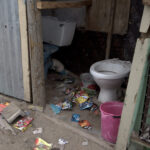South African health workers have to make difficult treatment decisions every day, but epidemics make it worse. Go inside the moral distress of working on the COVID-19 and HIV frontlines with two doctors who saw it first-hand.
Resource details:
Presentation title: Moral injury
Author(s): Dr Joanna Taylor
Publication date: 1 October 2020
What is the presentation about?
Specialist psychiatrist Joanna Taylor explains the difference between moral distress, moral dilemmas and moral injury and how the concepts form part of healthcare workers’ lives. The presentation looks into the way that rationing of health services during the COVID-19 pandemic may have exacerbated the moral injury health workers experience – and the mental health toll of their jobs.
Key take-aways from the presentation:
- Moral dilemmas are an everyday part of healthcare workers’ lives in which they may face difficult decisions with no clear solution, for example, which patient should receive treatment when there is not enough to go around.
- Moral distress happens when healthcare workers cannot carry out what they know is the right course of action because of a lack of resources in the health system, for example.
- When healthworkers feel they have failed their patients either by failing to prevent harm to them or if they’ve witnessed behaviours that flout their own deeply held moral beliefs, that is called “moral injury”.
- Moral injury is not a mental illness but it can result in negative thoughts about oneself as well as feelings of shame, guilt or disgust. This can in turn lead to mental health problems including depressions and anxiety.
- COVID-19 and South Africa’s stretched health system are a breeding ground for moral distress since doctors have to make difficult end of life decisions for patients with few resources while also battling shortages of personal protective equipment, and the loss of colleagues, patients and family.
- Health workers’ chances of experiencing moral injury are increased when leaders shirk responsibility for the events, or if staff aren’t prepared to deal with the psychological and emotional fallout of their decisions and have little support.
Download the full presentation here.
Resource details:
Webinar title: Moral injury and mental health: What COVID doctors can learn from HIV
Participants: Joanna Taylor, Tshepile Tlali, Francois Venter and Mia Malan
Publication date: 30 September 2020
What is the webinar about?
Key take-aways from the webinar:
Moral injury on SA’s COVID-19 frontlines
- South Africa’s changing testing guidelines were a source of moral injury, says Eastern Cape community service medical officer Tshepile Tlali. The health department restricted testing for the new coronavirus to those with symptoms who were over the age of 55 or had underlying health conditions, as well as healthcare workers or patients in hospital or old-age homes.
- Tlali explains: “As the numbers started to rise, lots of people came to the clinic whom we couldn’t test. I was worried that they would not isolate because they don’t have a certain diagnosis and they would infect other people. I felt responsible for that.”
- Testing backlogs also caused stress. Tlali and his colleagues were waiting for four weeks for results and by that time, the results were irrelevant to patients.
- Backlogs also affected Tlali at work since colleagues could not work until they got their results, putting pressure on an already short-staffed team.
- The Eastern Cape’s already dire ambulance shortage was compounded by the COVID-19 pandemic. This meant that Tlali’s patients who needed hospital care were stuck at the community health centre on oxygen cylinders. “For very sick people who were sitting outside in winter, I felt that stripped them of their dignity.”
What does COVID-19 moral injury feel like?
- Tlali says he started feeling irritable and burnt out. “I started to develop apathy in my work and my life. I found myself not caring.”
- His friends and colleagues advised him to take a break but he felt he had to stay on and work.
- In the end, the fact that Tlali contracted SARS-CoV-2 at work forced him to take a break. He explains: “It was a blessing in disguise.”
How does moral injury during COVID-19 compare with HIV?
- In the early 2000s, HIV scientist and clinician Francois Venter saw patients steadily stream into hospitals with the virus, many of whom died. “We saw hundreds of people dying on the floor of the hospital at the peak of the epidemic.” Venter is the divisional director of Ezintsha, a subdivision of the faculty of health sciences at the University of the Witwatersrand.
- Many staff started to treat patients as sub-human. “It was a way to cope with a government that was denying there was a problem.”
- Venter experienced moral outrage and injury when he was forced to treat senior politicians who were publicly denying that ARVs work.
- During the HIV epidemic, there was fear of contracting the virus, but that is worse with COVID, Venter argues, because HIV doctors could protect themselves with gloves and pre-exposure prophylaxis while COVID-19 doctors relied on masks that weren’t always available partly owing to the looting of the COVID-19 Relief Fund. “PPE corruption is a profound betrayal of healthcare workers.”
- Watch Venter speak about the effect of South Africa’s COVID-19 response on other diseases such as HIV and TB, or read his op-ed here.
How can health workers build resilience?
- Peer-support is one of the biggest protective factor against the mental health risks of moral injury, according to psychiatrist Joanna Taylor.
Feeling burnt out?
Health workers looking for support can contact the Healthcare Workers Care Network on their 24-hour hotline at 0800 21 21 21 or SMS 43001.
For more on moral injury watch the full webinar here.
Joan van Dyk was a health journalist, senior health journalist and news editor at Bhekisisa between 2017 and 2023.





